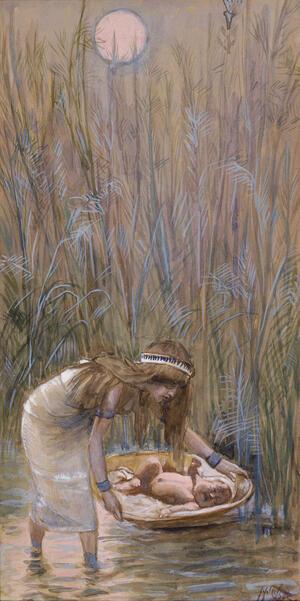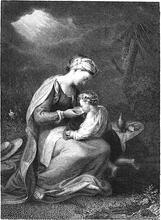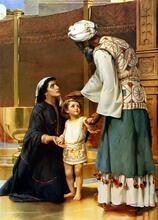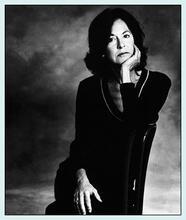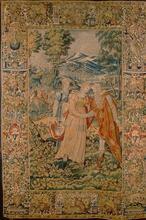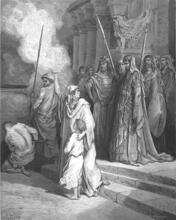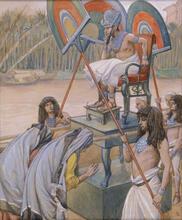Hebrew Women in Egypt: Midrash and Aggadah
The rabbinic retelling of the Exodus story uplifts the role of Israelite women in the redemption from Egypt. The Rabbis famously maintain that the Israelites were redeemed from Egypt by merit of the righteous women of that generation, who strove mightily to continue to bring forth children, regardless of the grueling servitude and despite Pharaoh’s decree that the male children be killed. God aided them in realizing their wish by miraculous means. This results in a generation that knew God intimately because of their mothers.
The Rabbis famously maintain that the Israelites were redeemed from Egypt by merit of the righteous women of that generation, who strove mightily to continue to bring forth children, regardless of the grueling servitude and despite Pharaoh’s decree that the male children be killed. God aided them in realizing their wish by miraculous means.
The Midrashic Story of Exodus
The A type of non-halakhic literary activitiy of the Rabbis for interpreting non-legal material according to special principles of interpretation (hermeneutical rules).midrash recounts that when Pharaoh decreed that “every boy that is born you shall throw into the Nile” (Ex. 1:22), some men abstained from relations with their wives. What did the Hebrew women do? They went to draw water, and God provided that half of their jugs be filled with water, and half with small fish. They would return home and place two pots on the fire, one for hot water and the other for the fish, which they would bring to their husbands in the field. There they washed them, anointed them, fed them, and lay with them between the two pots [shefatayim], as it is said (in Ps. 68:14), “Even for those of you who lie among the sheepfolds [shefatayim],” thus causing their husbands to engage in intercourse with them, despite the enslavement and the forced labor (BT Suspected adulteressSotah 11b; Ex. Rabbah 1:1).
The women were already pregnant when they returned home from the fields. When the time came for them to give birth, they cast their gaze heavenward, and said to God: “I have done my part regarding what You said, ‘Be fertile and multiply,’ now You do Your part.” The women would go to the fields to prevent the Egyptians from killing their sons and would give birth under the apple trees, as it says (Song of Songs 8:5): “under the apple tree I roused you; it was there your mother conceived you, there she who bore you conceived you.” God would dispatch two angels from heaven above who would cleanse the infants, as a midwife cleanses the newborn. They then brought the infants two round stones, one of oil and the other of honey, and they fed them, as is said (Deut. 32:13): “He fed him honey from the crag, and oil from the flinty rock.” According to another tradition, the Holy One, blessed be He, Himself cared for the infants, as it is said (Ezek. 16:9 –10): “I washed you in water […] I clothed you with embroidered garments” (Ex. Rabbah, 1:1; Deut. Rabbah [ed. Lieberman], 14–15).
When the Egyptians saw the Israelite women going to the fields to give birth, they would take stones and go to kill the infants. God performed a miracle, and the babies were swallowed by the earth. One tradition attests that the infants were swallowed in the field, to reappear far away, before being swallowed yet again and again, until the Egyptians tired and left. According to another tradition, the Egyptians would bring oxen and plow the ground in order to find the infants, but without success. After the danger had passed, the children would burst forth from the ground, like the plants of the field, as it is said (Ezek. 16:7): “I let you grow like the plants of the field; and you continued to grow up.” When they grew up, they returned to their homes in flocks, as the same verse says: “and you continued to grow up ba-adi adayim,” reading the latter phrase (literally, with the choicest adornments; usually translated, in the context of the verse, in the sense of “until you attained to womanhood”) as be-edrei adarim, “in flocks” (Ex. Rabbah 1:1; Deut. Rabbah, 14-15).
How did they know they should go to their homes? God would enter with them. He would show each one his house, and tell him: Your father is named so-and-so, and your mother is named so-and-so. The child would ask her: “Don’t you remember that you gave birth to me in such-and-such a field on such-and-such a day, five months ago?” She would ask him: “And who raised you?” And the child would reply: “A young man with curly hair; none is as fair as he. Here, he is outside and he brought me here.” His mother would request: “Show him to me.” They would go out and search in all the lanes and alleys, but they could not find him (Deut. Rabbah, 14-15).).
Children at the Red Sea
This is why when God was revealed to the Israelites at the parting of the Red Sea, the children were the first to recognize Him, since He had raised them and cared for them in their infancy. Consequently, they were the first to sing “This is my God and I will glorify him” (Ex. 15:2), for they had already met Him and knew Him at first hand. When they saw Him at the sea, they would tell their mothers, pointing with their fingers, “This is my God”—this is the fine young man who raised me (BT Sotah 11b; Deut. Rabbah, 14-15).

